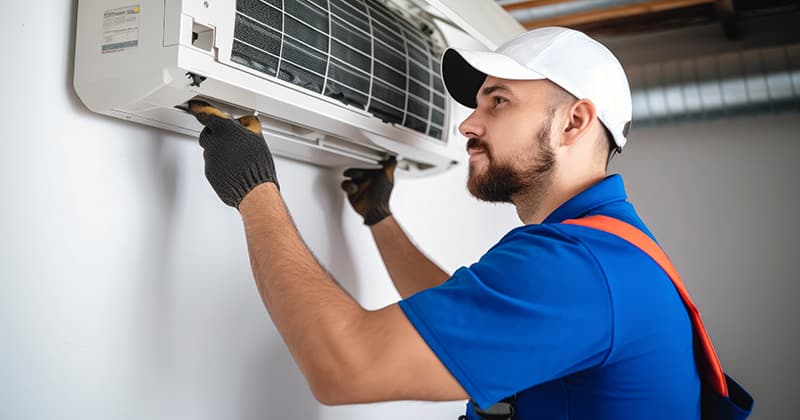
Lately, there has been a lot of talk about the US going into recession. But is a recession truly imminent?
Many economic analysts insist that ripples from the COVID-19 pandemic could still tank the economy within a year. Others believe we narrowly escaped a recession in 2022. And the ongoing Ukraine-Russia war has sparked fresh recession fears.
By the numbers, YCharts puts the US recession probability at just over 60%. Meanwhile, Goldman Sachs says there’s only a 25% chance of a recession in the next 12 months.
So, should we expect a recession or not?
Even the experts can’t seem to agree on this. As an entrepreneur, it’s always best to prepare for the worst, especially in times of uncertainty.
Wouldn’t it be great if your HVAC business was recession-proof? You wouldn’t have to worry about any impending economic turmoil.
In all seriousness, though, is HVAC recession-proof?
This article explores that very question. Read on to learn how recessions affect businesses. See why HVAC companies may be recession-proof. And, most importantly, understand how you can prepare for a downturn.
Let’s get started.
FROM ONE OF OUR PARTNERS: HVAC Marketing Strategies: How to Get More Leads
What Is a Recession and Why Does It Affect Local Businesses?

A recession is a significant countrywide economic decline over an extended period.
Only the National Bureau of Economic Research (NBER), through the Business Cycle Dating Committee, can declare a recession in the US. So far, the US has witnessed 14 major recessions since the Great Depression of the early 1930s.
The COVID-19 pandemic caused the most recent economic downturn. It lasted from February to April 2020, making it the shortest recession in US history (so far).
Economists consider several factors before declaring a recession. Familiar hallmarks of a recession include:
- Stock market decline
- Soaring inflation
- Tightening credit markets
- Plummeting real estate prices
- Dip in gross domestic product (GDP)
- High unemployment rate
- Inverted yield curve (long-term investments have lower yields than short-term investments)
- Drop in real income
A recession is bad news for nearly all businesses. More so for small enterprises. Here are the main challenges small and medium-sized companies face in a recession:
Low Sales
During a recession, consumers become wary about spending. People tend to buy only the essentials. They do away with luxuries and other unnecessary purchases.
Consequently, a majority of businesses suffer severe slumps in sales. The first businesses hit are usually those in the hospitality and entertainment sectors.
Sales generate income—the lifeblood of any business. Without a steady income, entrepreneurs struggle to run their businesses. Some will even shut down when the business becomes unsustainable.
Credit Crunch
One of the ways the government tries to control recession is by hiking credit interest rates. It seems counterintuitive, but it helps to minimize lending during difficult economic times.
Small businesses struggle to get affordable financing even at the best of times. High interest rates limit accessibility to funds even further. Many small businesses simply can’t afford the high cost of financing.
During a recession, credit challenges multiply. Businesses that rely on external funding to keep going begin to struggle. Some end up declaring bankruptcy and shutting their doors.
Employee Layoffs
Without a stable cash flow, it becomes difficult to sustain a workforce. Full-time labor costs quickly become a burden. In such a situation, the only logical choice is to let some workers go.
That’s exactly what happened during the last recession. Over a year after the pandemic hit, more than six million workers were still unemployed.
Unexpected downsizing is a huge blow to an already struggling business. It means redirecting the available or affordable workforce to the most critical tasks.
Broken Supply Chains
Remember, a recession is a nationwide problem. Many businesses you rely on to operate will be in the same boat as yours. Your suppliers, partners, and stakeholders are also facing layoffs and financial woes.
Ultimately, raw materials, spare parts, and various business inputs become scarce. This disrupts the supply chain and increases operational costs.
We saw this exact problem hit the lumber supply chain back in 2021. A pandemic-driven lumber scarcity caused prices to skyrocket to $1,690 per 1,000 board feet.
Competition Pressure
Recessions create a hostile, cut-throat business environment. Everyone desperately tries to elbow their way out in front.
The result is intense competition pressure—fierce price wars and hostile market takeovers. Unfortunately, most small businesses don’t have the muscle to fight off giant brands.
Smaller entrepreneurs are often driven out of business as larger companies infringe on their niches.
FROM ONE OF OUR PARTNERS: Top 5 HVAC Marketing Ideas That Work
How Can a Business Be Recession-Proof?

Recessions do not affect all businesses and industries equally. Some are hit harder than others. But is there such a thing as a recession-proof business or a recession-proof career?
Turns out there is. Some businesses power through. They emerge from recessions unscathed. Such businesses retain their customers and workforce. They maintain sales, profits, and supply chains when others can’t. In fact, some enterprises flourish during the tough times.
What’s the secret to recession immunity, or is it just luck?
It has to do with the business model and the industry. Below are the five main characteristics of recession-proof businesses:
Market with Steady Demand
Most recession-proof businesses enjoy continuing demand for their product or services. Demand does not fluctuate in some industries, regardless of the prevailing economic conditions.
Take healthcare, for example. People will still seek medical services even when times are hard.
Provide Need-Based Services
Businesses offering essential services are mostly unfazed by recessions. Need-based goods and services include:
- Healthcare
- Child and senior care
- Automotive services
- Utilities
- Basic foods and beverages
- Essential repairs
An essential service/commodity solves an immediate need that consumers can’t solve themselves. For example, consumers purchase food products because most cannot grow food themselves.
Deal in Highly Specialized Services
Brands offering highly specialized services stay in business during recessions. Consumers will always buy from you if there’s no alternative to what your business sells.
For example, IT businesses dealing in proprietary software applications did well during the last recession. In April 2020, Microsoft CEO Satya Nadella said they had seen two years of digital transformation in just two months. The report came as sales for Microsoft’s remote collaboration apps soared.
Sell at Discounted Prices
Budgets are tight during a recession, meaning consumers have low spending power. Naturally, many seek bargains to save money. So, businesses offering a good value thrive in a hurting economy.
Highly Adaptable
Some businesses survive through recessions because they’re flexible. They’re able to adapt to changing circumstances. They make the best of bad situations.
We saw flexibility in action during the worst of the COVID-19 pandemic. Many companies survived by pivoting. They met new demands, opportunities, and challenges.
For example, restaurants turned to food delivery services. Tutors switched to online classes. And manufacturers started churning out in-demand PPE products. But, recession or not, adaptability is key to business resilience.
Why HVAC Careers Tend to Be Recession-Proof

Let’s refocus on the HVAC industry and how it fairs against recession.
HVAC companies are generally said to be recession-proof or recession-resistant. Is there any truth to that claim? Well, yes, and here’s why:
HVAC Service Technicians are Essential Workers.
HVAC workers are designated as “essential workers” under “critical trades.” HVAC technicians conduct operations and services that are necessary for critical infrastructure operations.
By extension, an HVAC job is a stable, well-paying career. And it doesn’t take much to become a highly skilled HVAC technician either. You just need a passion for the job. That, and 1 to 2 years in a trade school program.
It’s easy to see how HVAC skills might be a solid investment.
HVAC Is a Necessity.
We mentioned need-based services as one of the hallmarks of recession-proof businesses. Interestingly, HVAC services fall into that category. Much like groceries and healthcare, heating, cooling, and ventilation are necessities.
Sales for new HVAC units might fall during hard times. But even so, households will still be running an HVAC system.
Plus, essential hospitals, factories, and offices will still need to keep their HVAC systems running smoothly.
HVAC Services Save Money During Recessions.
Consumers are always looking to save money during a recession. For many households, an efficient HVAC unit is a much-needed money saver.
The average American household spends $2,284 per year on gas and electricity. Most of this spend—$1,346—goes towards heating and air conditioning. Cutting these costs would be a welcome relief, especially when facing financial hardships.
A well-maintained HVAC system consumes less power. That means lower power bills. Some homeowners take the cost savings one step further. They replace older HVAC systems with newer, more efficient models.
The HVAC Industry Is Mature and Futureproof.
A stable industry is less likely to succumb to a recession. The HVAC industry checks that box, too.
The US HVAC services market is currently worth $18.62 billion. That figure is expected to reach $25.62 billion by 2028. We’ll see a steady 6.6% CAGR during the forecasted period.
HVAC technicians are in high demand as well. According to the US Bureau of Labor Statistics (BLS), the HVAC employment rate is set to grow 6% from 2022 to 2032.
That’s faster than the average growth rate for all occupations. The BLS predicts 37,700 new HVAC jobs annually.
These figures are indicative of a stable industry with a bright future ahead.
Get Your HVAC Business Prepared Now

HVAC contractors are, to an extent, recession-proof. However, different HVAC businesses perform very differently under economic pressures.
In other words, you must put in some effort to reinforce your business against recessions.
Here’s how you can do that:
Make a Solid Financial Plan.
One study found that 82% of businesses fail due to cash flow mismanagement. Cash problems become exponential during an economic crisis. So, ensure your financial plan caters to the possibility of a recession.
Here are essential financial tips for recession-proofing your HVAC business:
- Devise a pricing strategy that can adjust for inflation.
- Develop accurate cash flow projections to prepare for financial insecurity.
- Think twice before making huge purchases.
- Secure capital as needed.
- Keep an emergency cash reserve sufficient to run the business for at least three months.
- Cut spending to a minimum.
- Avoid relying on credit.
FROM ONE OF OUR PARTNERS: How to Write an HVAC Invoice (with Free Invoice Template)
Cultivate Close Relationships with Your Suppliers and Partners.
Maintain close, mutually beneficial relationships with your HVAC suppliers and partners. That way, they’ll keep you in the loop when things get tough.
For instance, they’ll warn you of a looming scarcity of HVAC parts and products. That could buy you valuable time to stockpile before price hikes. Also, if you are close to your suppliers, they’ll be more willing to supply your business on credit.
Build a close-knit, strategic business community. Support and mind each other during difficult times.
FROM ONE OF OUR PARTNERS: Why Contractors Should Partner with Suppliers
Build an Agile Workforce.
Assemble your team of HVAC technicians with recession-proofing in mind. Besides the usual qualifications, vet each worker’s essential soft skills before hiring. Ensure each of your employees possesses the following traits:
Emotional intelligence: Can the employee handle the pressure and stresses of the job?
Creativity: This is an important trait in technical HVAC jobs. A creative employee can find unique solutions to common and novel problems.
Leadership qualities: Every employee should be their own boss.
Adaptability: Hire HVAC workers who can react quickly to occupational changes. A recession may force you to rapidly adjust your business model. It instantly changes employee roles and responsibilities.
Project management skills: Ensure employees understand that HVAC jobs are contractual projects. Each project has specific goals, requirements, and constraints.
Consider digitizing crew and project management with state-of-the-art HVAC software.
Turn to Your Strengths.
What makes your business unique? You have something that differentiates your brand. It could be exceptional expertise or exclusive repair licenses/certifications. It might be your affordable pricing or excellent customer service.
Identify your strength and make it your unique selling point (USP).
Remember, dealing in specialized or unique services could recession-proof your business. Give customers enough reason to buy from you even when times are lean.
Related Posts
How to Create a Plumbing Estimate Template [Free Template Download]
Continue ReadingManaging Google Reviews for Your HVAC Business
Continue ReadingStay Informed
Get the latest news and insights plus, Service Fusion offers and updates.Thank you for your submission.

SHARE